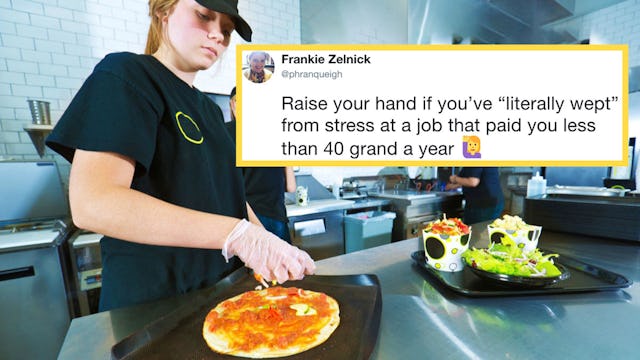This Twitter Thread Shows The Emotional Toll Of Many Jobs

The former CEO of Westpac, David Morgan, discusses real life as a CEO in his recently released biography, because, as he tells The Age, “life as a CEO was rarely openly discussed.” “You can hardly ever relax, and that creates intense strain. Behind closed doors, some CEOs literally weep” in private, he said in an interview with the book’s author, journalist Oliver Brown. They literally cry.
Well, cry me a fucking river.
Twitter user Frankie Zelnick asked, “Raise your hand if you’ve ‘literally wept’ from stress at a job that paid you less than 40 grand a year.”
Her tweet has literally tens of thousands of comments because it is just so damn relatable.
“There was something about The Age’s original tweet quoting David Morgan that really struck a nerve with me,” she told Scary Mommy, “because even when people ARE able to acknowledge the pay inequities that exist in our country, there continues to be this resonating narrative that people are paid fairly for the work that they produce, that hard work is measured in dollar amounts, and it’s just not true. To imply that the thousands upon thousands of people who are working 60 plus hours a week, making difficult decisions and often standing on the front lines of customer service, are poor because they aren’t working hard enough is such an ugly, demeaning, dangerous way to think.”
“Every single teacher I know has literally wept over their job in private. Every single one,” responded Annie Reneau.
And ain’t that the truth.
My mother is a teacher. My husband is a teacher. Many of my dear friends are teachers. And I can tell you that this is true: I have never known a teacher who did not, at some point in their career, break down over stress that comes from their jobs. They’re expected to instill academic knowledge while maintaining discipline and acting as unofficial social workers.
As one teacher recently told me, “They never tell you how much of a social worker you’ll need to be when you take this job.” Most teachers, especially new ones, make under $40,000 a year.
Then there are the tweets about suffering a miscarriage while on the job. A shocking number of them, in fact.
Rachel McShane tells the horrible story of being an adjunct professor, making $20,000 a year, and having an active miscarriage. She was too afraid to reschedule her biannual review, so she taught a three hour class in a diaper. And CEOs are weeping from the stress of their jobs while making hundreds of thousands of dollars?
And speaking of adjunct professors, or so-called teaching assistants like Rachel McShane, who often have terminal degrees (Ph.D.s or MFAs) and get paid peanuts — good fucking luck. I was one. I made under 24K a year and I cried, especially around exam time. At least two others weigh in on the thread:
Basically, as an adjunct instructor, you have no job protection, no health insurance. You’re also crippled with student loans and often teaching at multiple institutions at once, all while scrambling to find a “real” job at a university with a chance at tenure, meaning you need to attend conferences, the academic equivalent of job fairs, held in different parts of the country. Which means flying on a shoestring budget. You eat ramen and cry.
Many people describe mental health breakdowns.
When your job gives you panic attacks so bad you have to be hospitalized, or you think you should kill yourself to escape your life, or you end up cutting yourself — this is real stress. This isn’t “literally weeping.” This is soul-crushing despair, the type of misery that only happens when people are pushed to their ultimate breaking points. You can’t ask these things of people. And yet we continually devalue the work they do — especially if they’re retail or fast-food workers — and laud CEOs who are only “literally weeping” in private.
People even discuss the best places to lose it.
When you’re discussing, in public, the best places at your job to cry — and finding solidarity and advice for it — there’s clearly a problem going on. And it has to do with people devaluing your job. It has to do with people treating you like you’re subhuman, like you don’t matter, like you aren’t important. CEOs might cry because of stress. These people are crying because they’re treated like human garbage. On such a regular basis that they’ve staked out special places to cry. That they’re willing to share with Twitter.
So who cares about CEOs making millions who cry in their offices with the doors shut? Not me. I’m more concerned about these terrible stories, the tweets that go on and on and on, about bad jobs, about people weeping, about stress and stress and more stress, about the everyday people who live in misery. Some of the responses are just beyond heartbreaking. As Zelnik says in another tweet, “I want to print out every response in this thread and plaster the pages on billionaires’ homes.”
Staple them to the billionaires’ doors indeed. Let the world see how regular people live.
This article was originally published on